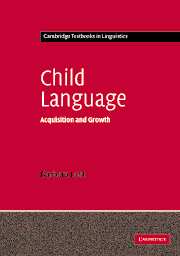Book contents
- Frontmatter
- Contents
- List of figures
- List of tables
- Preface
- Acknowledgements
- 1 The Growth of language
- 2 What is acquired?
- 3 What is the problem of language acquisition?
- 4 How we can construct a theory of language acquisition
- 5 Brain and language development
- 6 The nature of nurture
- 7 How can we tell what children know? Methods for the study of language acquisition
- 8 The acquisition of phonology
- 9 The acquisition of syntax
- 10 The acquisition of semantics
- 11 On the nature of language growth
- 12 Conclusions: toward an integrated theory of language acquisition
- Appendices
- 1 Developmental milestones in motor and language development (adapted from Lenneberg 1967)
- 2a Developmental milestones in infant speech perception
- 2b Examples of sound distinctions perceived by infants
- 3 Developmental milestones in infant speech production
- 4 Developmental milestones in infant syntax: perception
- 5 Developmental milestones in infant syntax: production
- 6 Developmental milestones in infant semantics
- 7 Abbreviations and notations
- Glossary
- References
- Author index
- Subject index
3 - What is the problem of language acquisition?
Published online by Cambridge University Press: 05 June 2012
- Frontmatter
- Contents
- List of figures
- List of tables
- Preface
- Acknowledgements
- 1 The Growth of language
- 2 What is acquired?
- 3 What is the problem of language acquisition?
- 4 How we can construct a theory of language acquisition
- 5 Brain and language development
- 6 The nature of nurture
- 7 How can we tell what children know? Methods for the study of language acquisition
- 8 The acquisition of phonology
- 9 The acquisition of syntax
- 10 The acquisition of semantics
- 11 On the nature of language growth
- 12 Conclusions: toward an integrated theory of language acquisition
- Appendices
- 1 Developmental milestones in motor and language development (adapted from Lenneberg 1967)
- 2a Developmental milestones in infant speech perception
- 2b Examples of sound distinctions perceived by infants
- 3 Developmental milestones in infant speech production
- 4 Developmental milestones in infant syntax: perception
- 5 Developmental milestones in infant syntax: production
- 6 Developmental milestones in infant semantics
- 7 Abbreviations and notations
- Glossary
- References
- Author index
- Subject index
Summary
Getting started
In this chapter, we define essential aspects of the problem children face in language acquisition. We characterize the severity of a “Projection Problem” by an analysis of the types of evidence children might be expected to need in order to acquire a language. We see that not only is “negative evidence” generally not accessible to children, but also that “positive evidence” in the speech stream is fundamentally indeterminate with regard to the knowledge children must acquire. Both are always only “indirect.” Given that the evidence available to children is fundamentally insufficient, we consider two possible approaches to “bootstrapping” from external (non-linguistic) evidence which they might alternatively try to solve the problem of language acquisition, and show that neither of these can solve the fundamental problem. We conclude that the evidence available to children can not in itself fully determine the linguistic knowledge they must acquire, and that no form of “bootstrapping” from solely extra-linguistic evidence can solve this problem. We therefore must look within children, beyond the input, for an explanation of language acquisition.
What evidence do children need?
We saw in chapter 2 that children must acquire a generative system which allows infinite possibilities in language, and also rules out infinite impossibilities. For this, we would expect them to need both positive and negative evidence.
- Type
- Chapter
- Information
- Child LanguageAcquisition and Growth, pp. 28 - 48Publisher: Cambridge University PressPrint publication year: 2006



